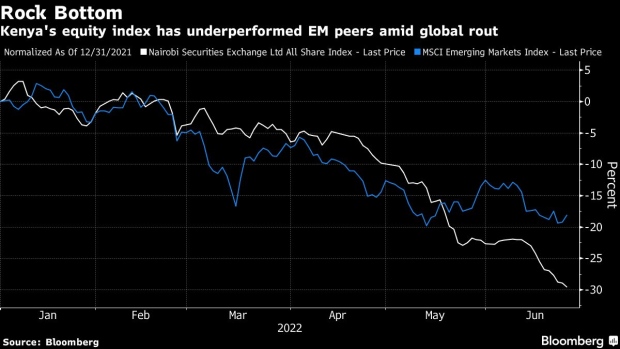Jun 25, 2022
Global Equities Rout Hits Kenya’s Benchmark Harder Than Most
, Bloomberg News

(Bloomberg) -- There’s no place to hide for Kenya’s battered stock market amid the turmoil that’s weighed on equities globally this year.
The benchmark index of East Africa’s largest economy is down 29% this year, with only crisis-hit Sri Lanka posting a deeper decline among 92 primary gauges tracked by Bloomberg.
Slowing growth, rising inflation, and the approach toward a closely contested election are adding to worries for investors in the 63-member exchange. Stocks may have further to fall as central banks around the globe tighten monetary policy and the Kenyan shilling, already at a record low against the dollar, extends its record decline.
“It’s tough to call the bottom at this time,” said Silha Rasugu, a research analyst at EFG Hermes in Nairobi.
A 37% slump for the index’s biggest constituent, Safaricom Plc, hasn’t helped, with foreign investors especially exiting holdings of the the mobile-phone company which reported lower revenue and earnings last month, according to Hasnain Malik, an equities analyst at Tellimer.
Rising yields on Kenyan bonds offer better returns for local investors than the stock market, with inflation eroding corporate margins and earnings, said Ephantus Maina, senior research analyst at Nairobi-based Kestrel Capital.
To be sure, some investors think stock prices have fallen enough to reflect many of the concerns. Current levels present a “very attractive entry opportunity” for investors, said Lisa Kimathi, an analyst at Nairobi-based Standard Investment Bank.
But investors are unlikely to jump back into the fray given the uncertainty ahead of the presidential election set for Aug. 9. Opposition leader Raila Odinga, the front-runner on the ballot, spooked investors recently when he said he would restructure the nation’s debt. Yields on Kenya’s 2024 Eurobonds have soared 462 basis points this month to 15.34%.
It’s typical for share prices to decline ahead of Kenyan elections, said George Bodo, head of research at Genghis Capital in Nairobi, who expects shares to recover in the fourth quarter.
©2022 Bloomberg L.P.








